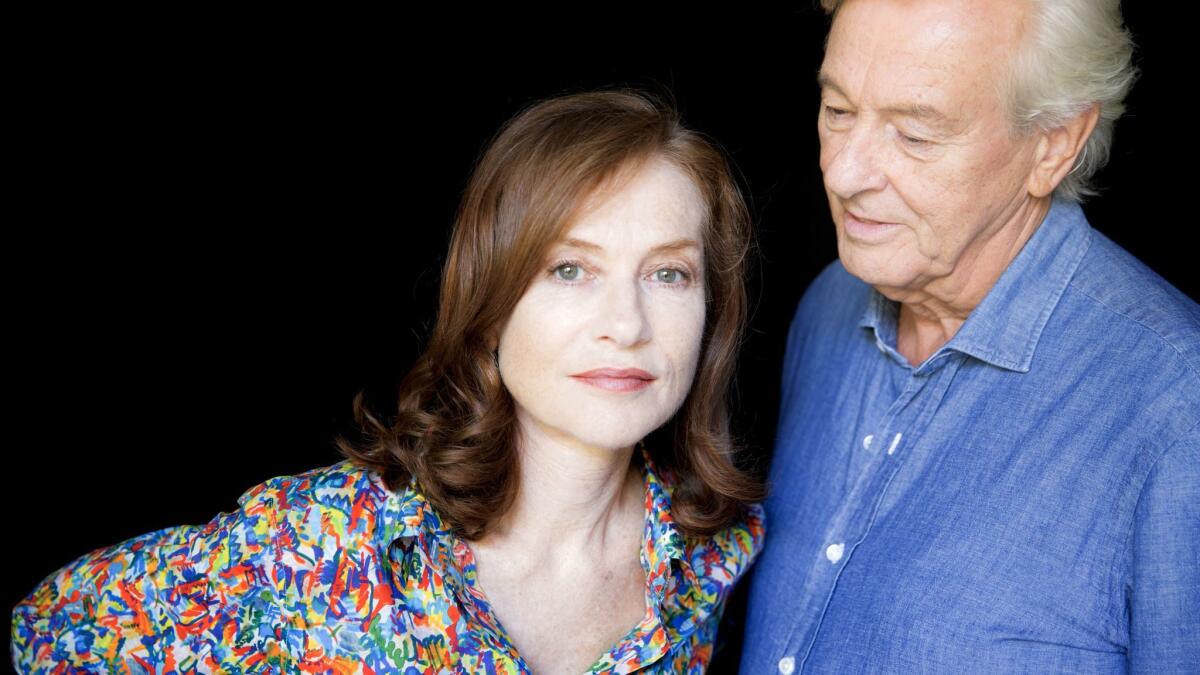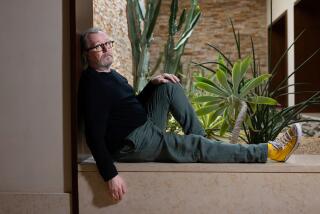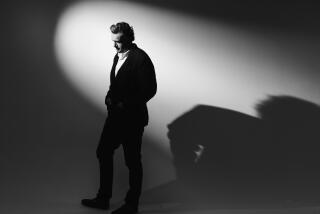Isabelle Huppert and Paul Verhoeven, no strangers to subversive themes, share ‘a secret force’ that is ‘Elle’

On paper it might seem an unlikely creative pairing: Isabelle Huppert, star of uncompromising art-house fare including “The Piano Teacher” and “White Material,” and director Paul Verhoeven, who has brought a singular mix of high-concept and pulp to such blockbusters as “Total Recall,” “RoboCop” and “Basic Instinct.”
But their indelible work on “Elle,” their first collaboration — and the Dutch auteur’s first French production — makes the partnership feel so inevitable that it’s easy to retroactively imagine Huppert in Verhoeven films like the coming-of-age drama “Spetters.”
“Or ‘Showgirls,’” Huppert says with a smile.
In conversation on a late-summer midday in Los Angeles, just before heading to the Toronto film festival for the movie’s North American premiere, their mutual enthusiasm for the story of Michèle Leblanc couldn’t be more clear. The unconventionally resilient protagonist of “Elle” is a high-powered Parisian businesswoman whose reaction to being raped sets off an unpredictable game of sleuthing, seduction and life-changing awakening. While Huppert and Verhoeven are no strangers to nonconformist female characters and subversive themes, Michèle stands as a bracingly original figure.
She’s neither a victim nor avenger. She takes control after what happens to her, but in a very unexpected way.
— Isabelle Huppert
“She’s neither a victim nor avenger,” Huppert says. “She takes control after what happens to her, but in a very unexpected way.”
Praising screenwriter David Birke’s adaptation of Philippe Djian’s novel “Oh…,” Verhoeven notes that even Michèle’s initial response to her attack sets her apart from the norm. “In the first three minutes of the movie, basically, you have the character,” he says. After matter-of-factly cleaning up, she makes a call — to order sushi, a detail the director adores.
His knack for steering through a range of tones, from suspense to comedy to terror, has been a hallmark of his work, and has sometimes gotten him in trouble. As far back as 1969, viewers protested the inclusion of violence in the historical TV series “Floris,” a show aimed at families. “I thought torture was normal in medieval times,” Verhoeven recalls, laughing.
As to any controversy over “Elle,” a film that at least one critic has dubbed a “rape comedy” — a label Verhoeven views as cheeky and unfair to the movie — one thing soon becomes clear: To anticipate hypersensitivity over Michèle’s seemingly blithe post-assault behavior might be a particularly American, trigger-warning-wary reaction. Upon its release in Europe, the movie unleashed no firestorms of opinion. Director and star emphasize that it’s one woman’s story, not a statement about womankind.
That’s what films are made for, to explore one’s fantasies.
— Paul Verhoeven
Huppert likens it to a fairy tale, adding that the transgressive quality of art is often what makes it enjoyable — as her and Verhoeven’s filmographies attest. “That’s what films are made for, to explore one’s fantasies.” But those fantasies embody truth. She especially liked Michèle for the way her life becomes “an accumulation of burdens that she has to carry no matter what,” reflecting the reality that we all experience to varying degrees.
In Michèle’s ongoing attempt to evade her exceptionally painful background as the daughter of a notorious criminal, she prefers to look forward, not back. But as Huppert observes, “for every human being, even if you don’t look back, the past looks on you anyway … and determines, in a way — unconsciously, perhaps — what you do or you don’t do.”
The past plays upon Michèle in increasingly powerful ways, but perhaps none as astounding as a moment of sexual climax, performed with extraordinary intensity, that breaks open the story’s emotional dams.
“It’s about her whole life,” Verhoeven says of Michèle’s unforgettable orgasm. He turns to Huppert. “I mean, that’s how you did it.”
The actress agrees, although it’s not something she had strategized beforehand. “It’s a moment of emotion, it’s a moment of loneliness, it’s a moment of something paroxysmal.”
And it’s a moment that’s followed by the most banal of exchanges on a nighttime street, one of the many mood shifts that Verhoeven navigates fluently. For Huppert, the layers of irony that he conjures throughout the film are among its chief pleasures, for actor and audience alike. For Verhoeven, the “multiple extreme switches” represented an opportunity to “escape genre.”
“How to do a thriller, I knew,” he says. But “Elle,” in many respects a comedy of manners, offered the chance to explore relationships as he never before had. Each of Michèle’s relationships — to her son, mother, lover, ex-husband, best friend, neighbors — is a nuanced and frequently shocking narrative thread. Those interpersonal dramas were one of the main reasons Verhoeven wanted to direct “Elle,” his first major feature in a decade.
He was so drawn to the project that he agreed to work in France, and succumbed to months of anxiety headaches as he brushed up on French. Directing in a language that wasn’t his first or second was a frightening prospect for him but one that Huppert says paid off, creating a crucial synergy on the set. Verhoeven was so committed that even when she spoke to him in English, he responded en français.
Many months later, on a Los Angeles restaurant patio, as they listen to each other and their voices sometimes intertwine, French is still a bond.
As the conversation winds down, Verhoeven delightedly describes his after-the-fact realization that the movie’s two final scenes are the only ones filmed under sunny skies. Even if he had intended this, he hadn’t the budget to wait “like David Lean,” as he wryly puts it, for the right weather conditions.
No less delighted by this serendipitous turn of cinematic events, Huppert insists that “film has a life of its own.”
“Yeah,” Verhoeven agrees, “there is something happening that you don’t control anymore.”
Huppert turns to the director, speaking in French as she searches for words to describe this untamable aspect of the creative experience. Head bowed, he listens, then looks up and translates. “A secret force,” he says, and the star of “Elle” nods emphatically.
See the most read stories this hour »
More to Read
From the Oscars to the Emmys.
Get the Envelope newsletter for exclusive awards season coverage, behind-the-scenes stories from the Envelope podcast and columnist Glenn Whipp’s must-read analysis.
You may occasionally receive promotional content from the Los Angeles Times.







